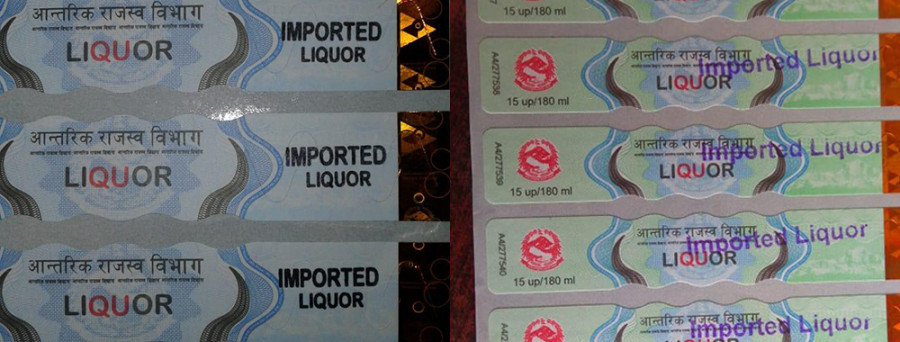National
Tax authorities, government-run presses negotiating deal to print excise duty stickers
The department is considering to assign the job to a government press after the Indonesian company selected to print the stickers failed to show up to sign the contract.
Prithvi Man Shrestha
The Inland Revenue Department is preparing to assign government-owned presses to print excise duty stickers, after it faced acute shortages due to delays in selecting contractors for the job.
The department is talking to the Department of Printing and Janak Education Material Centre Limited over a possible deal to print the stickers of stickers that need to go on all liquor and tobacco products sold in the country.
“Talks with these government agencies (Department of Printing and Janak Education Materials) are underway on printing the stickers,” said Thaneshwor Gautam, deputy director-general at the tax department. “I hope we will be in a position to decide within a week.”
Tax officials were forced to seek alternatives after Perusahaan Umum Percetakan Uang Republik Indonesia (Perum Peruri), selected to supply the stickers in March, didn’t show up to sign a contract with the department.
The procurement process, started last year, was delayed after the Supreme Court in November issued a stay order on the deal in response to a writ petition arguing that the domestic printers were not allowed to take part in the bidding process. But on February 24, the court allowed the tax authority to resuscitate plans to buy such stickers by vacating the earlier interim order, giving a sigh of relief to the officials of the tax authority.
After the clearance from the court, the Perum Peruri, the lowest evaluated bidder, was selected to print and supply stickers and invited for signing the contract.
Shivadevi Dahal, deputy director-general at the department, said the tax authority has run out of stock for five of the 39 stickers. She said that almost all stickers would have been used up if it were not for the Covid-19 pandemic which forced industries to shut down.
Gautam said that given the urgent need for stickers, the department is not thinking about an international bidding process once again. “It takes 9-10 months for the delivery of stickers if we start the process for an international tender,” he said. “Domestic private firms are not under consideration at the moment.”
A senior official at Janak Education Material Centre Limited also confirmed that the talks are ongoing for printing of stickers. “The first phase of the talks has been completed,” said Mahesh Prasad Timilsina, general manager at the company, which usually prints text books for government schools. It had also printed ballot papers for the federal, provincial and local elections in 2017.
In the late 1990s, it had printed stickers for the tax authority.
But, Timilsina said that his office does not have a printing press that can print stickers with their existing features. “There has been talk about altering some features to enable us to print the stickers,” said Timilsina. “But, nothing has been concluded yet.”
Liquor producers and importers fear that substandard stickers could result in use of counterfeit stickers to push fake products in the market.
But, the department is in urgent need of stickers to meet the market demand as liquor and cigarette factories have resumed operations after the government relaxed the Covid-19 lockdown on June 10.
As the government has banned the import of liquor, the Inland Revenue Department doesn’t have to worry about stickers for imported liquor, at least for now as the tax authority had long run out of the stickers for imported liquors.
Although the department could award the contract to the second lowest bidder, a Lithuanian company, the department refused to do so, citing some technical issues.
The Lithunian company then moved the Supreme Court citing section 27(6) of the Public Procurement Act, which says contracts should be awarded to the second-ranked bidder if the first-ranked bidder refuses to sign the deal.
This created further problems for the department to issue a fresh tender. This is also one of the reasons why the department seeks to print the stickers at a government-owned press. “The situation with stickers is very bad. We need an urgent solution,” Dahal said.




 9.83°C Kathmandu
9.83°C Kathmandu














